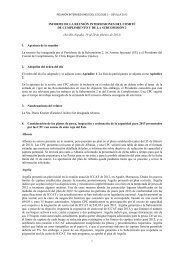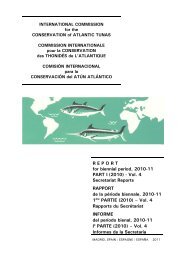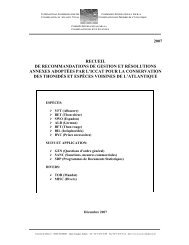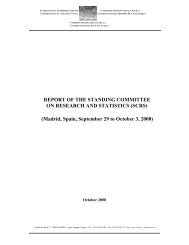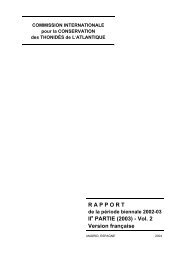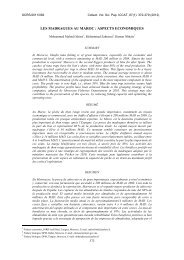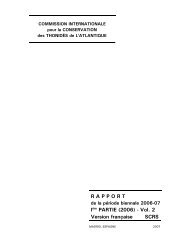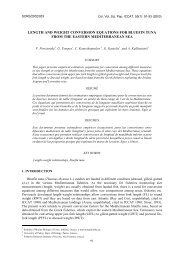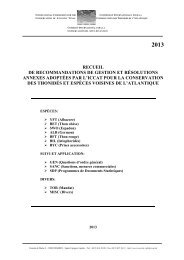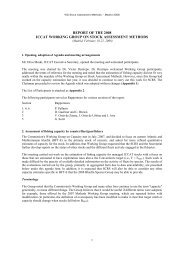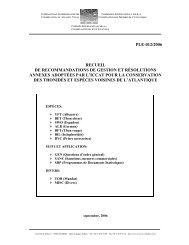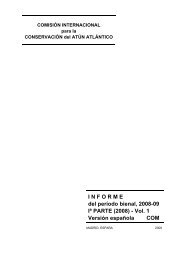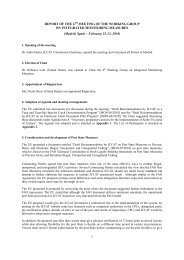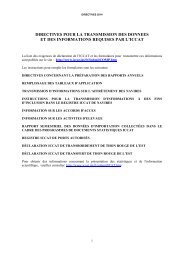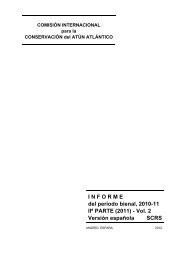E - Iccat
E - Iccat
E - Iccat
Create successful ePaper yourself
Turn your PDF publications into a flip-book with our unique Google optimized e-Paper software.
ADDRESSES & STATEMENTS<br />
With roughly 30 species within its purview, ICCAT CPCs must show their commitment to strengthening<br />
management, ensuring compliance, and broadening the current priorities of this Convention beyond merely<br />
single species management. In particular, most shark species caught in ICCAT fisheries are completely<br />
unmanaged - important species such as shortfin makos and blue sharks are caught without any limits, highly<br />
threatened species such as porbeagles continue to be landed and sold. This group of vulnerable fishes must be a<br />
priority for precautionary management.<br />
Oceana believes that eastern bluefin tuna should be allowed to follow a stable path towards full recovery, while<br />
ICCAT broadens its focus and addresses the management of the remaining ICCAT fisheries.<br />
Oceana calls upon ICCAT CPCs to:<br />
−<br />
−<br />
−<br />
−<br />
−<br />
Secure the recovery of eastern bluefin tuna, by maintaining current TAC levels, in accordance with<br />
SCRS Recommendations.<br />
Set science-based, precautionary limits on catches of shortfin mako and blue sharks, which are key<br />
targeted species in ICCAT fisheries.<br />
Prohibit the retention, landing, and trade of highly threatened species, such as porbeagles.<br />
Close the loopholes in the ICCAT ban on shark finning, by requiring sharks to be landed with their fins<br />
attached policy in ICCAT Convention area.<br />
Show real commitment to establishing a culture of compliance, which is essential for effective fisheries<br />
management.<br />
Pew Environment Group<br />
The Pew Environment Group thanks delegates at this meeting of the International Commission for the<br />
Conservation of Atlantic Tunas (ICCAT) for the opportunity to discuss science-based measures for Atlantic<br />
bluefin tuna, conservation and management measures for sharks and compliance with ICCAT measures. We<br />
thank the Moroccan government for its excellent efforts in organizing this meeting.<br />
We call your attention to our policy statement, “Better Management for all ICCAT Species: Time to Fill in the<br />
Puzzle Pieces”, which was circulated electronically to all Contracting Parties (CPs), and is available on our<br />
website at www.pewenvironment.org/ip (in English, French, and Spanish) along with copies of our other<br />
materials. The following supplements that policy statement and other documents.<br />
Recommendations<br />
The Pew Environment Group is encouraged that ICCAT has taken steps in recent years towards more sustainable<br />
management of tunas and sharks, as well as improving compliance with existing management measures.<br />
However, more work is still needed as these actions are not yet sufficient to ensure compliance with existing<br />
measures, and initially restore and then guarantee healthy tuna and shark populations across the Atlantic Ocean,<br />
or to fully implement the outcomes of Rio+20.<br />
ICCAT members must heed the science and fully address illegal fishing and the catch of associated and<br />
dependent species. Added to this, ICCAT should also begin the formal process of amending its treaty to<br />
explicitly include sharks as managed species and ensure that sound science, the ecosystem approach and the<br />
precautionary principle underpin all decisions made and ensure they are as robust as possible. ICCAT can then<br />
begin to transform itself into a leading voice for long-term sustainability.<br />
We recommend that ICCAT take the following 10 critical actions at this year’s meeting:<br />
1) Adopt science-based measures for Atlantic bluefin tuna<br />
This year’s annual ICCAT meeting is a critical time for Atlantic bluefin tuna. ICCAT’s scientific committee<br />
(Standing Committee on Research and Statistics, SCRS) updated its stock assessments this year for Atlantic<br />
bluefin and provided strong management advice favouring precaution in setting quotas for both the eastern and<br />
western populations. ICCAT members should follow clear and strong scientific advice to maintain quotas at<br />
current levels through at least 2015, which will allow both stocks to continue to increase. Members must also<br />
look to the future and ensure that the scientific model used to determine the status of the population is sound and<br />
that illegal fishing is accounted for and addressed.<br />
61



